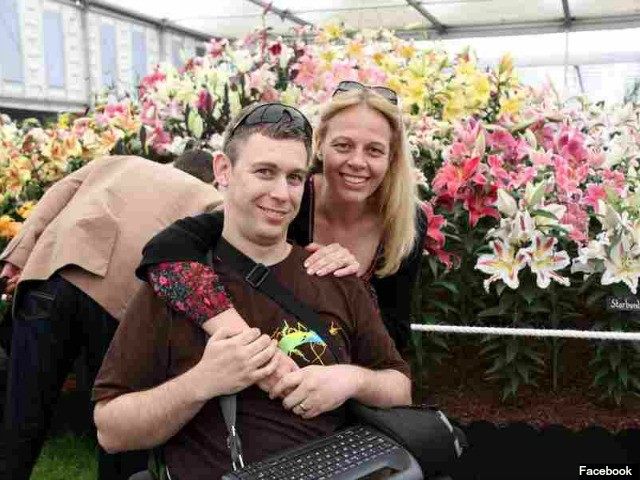When Martin Pistorius was 12 years old, an unknown serious illness caused him to fall into a coma, where he remained for the next 12 years. Despite his poor prognosis, his family continued to care for him, not knowing their son could hear them and was aware of all that was happening around him. Now, he has written a book about that experience.
In Ghost Boy: My Escape from a Life Locked Inside My Own Body, Pistorius tells the story of how, in the late 1980’s in South Africa, he began to deteriorate from a mysterious illness, though doctors suspected he had developed cryptococcal meningitis, a fungal infection of the tissues surrounding the brain and spinal cord. Ultimately, he fell into a coma, and though doctors told his parents to take him home from the hospital and keep him comfortable until he died, Pistorius’s mind was far from dead. Yet, he tells National Public Radio (NPR) he knew everyone around him believed he could not hear them and that he was unaware of his surroundings.
In his book, Martin Pistorius relates what it was like to be “locked” in his body, unable to communicate with his family and others, yet aware of all that was going on around him. His father, Rodney, bathed and dressed him each day, drove him to the special care center, and woke himself every two hours at night to turn his son’s body over so he would not develop bed sores.
And Martin Pistorius continued to live.
“Everyone was so used to me not being there they didn’t notice when I began to be present again,” he said, noting that he started to regain awareness of everything, “just like any normal person,” about two years into his vegetative state. Still, his body was unable to move.
“The stark reality hit me that I was going to spend the rest of my life like that – totally alone,” Pistorius says, recalling his overwhelming negative thoughts.
“No one will ever show me tenderness. No one will ever love me,” he thought, coming to the conclusion that he was “doomed.”
Pistorius says he strategized that the only way to survive in that state was to turn off his thoughts.
“You don’t really think about anything,” he recalls. “You simply exist. It’s a very dark place to find yourself because, in a sense, you are allowing yourself to vanish.”
Nevertheless, Pistorius discovered there were some events occurring around him that he could not ignore. For example, at the day care center, he often spent hours in front of the TV watching repeats of children’s shows.
“I cannot even express to you how much I hated Barney,” he now states.
At yet another time, Pistorius remembers hearing Whitney Houston sing “The Greatest Love of All” on the radio while an attendant at the day care center was wiping drool from his face. He says he heard Houston sing, “No matter what they take from me, they can’t take away my dignity!”
“I sat there and thought, ‘You want to bet?’” while listening to those words.
Finally, however, Pistorius states he had “had enough” of cutting off his thoughts. Motivated by his desire to know when Barney would end, but never seated near a clock in the special care center, he trained himself to tell time by watching the shadows of the sun, an experience that helped him feel in control of his life. He was gradually able to reframe other thoughts and consider things in relation to other things.
A particularly difficult experience, he relates, was when his mother, not knowing he was aware of what she was saying, said to him, “I hope you die.”
“The rest of the world felt so far away when she said those words,” Pistorius remembers. Still in his uncommunicative state, he struggled with his mother’s words, but eventually developed empathy enough to understand why a mother – his mother – would speak them.
“As time passed, I gradually learned to understand my mother’s desperation,” he now says. “Every time she looked at me, she could see only a cruel parody of the once-healthy child she had loved so much.”
Joan Pistorius now says of her statement to her son, “I know that’s a horrible thing to say. I just wanted some sort of relief.”
Making the decision to re-engage his thoughts helped Pistorius feel better emotionally and, subsequently, his body began to change, as well.
When he was 26, it became known that Pistorius was able to identify objects with his eyes. Subsequently, his mother resigned from her job and worked with her son for two years, teaching him how to use a computer.
Eventually, Pistorius got an office job, but he left it to go to college to study computer science. He then started a web company and wrote his book. Now, he is learning to drive.
“Martin achieves everything he wants to do,” his mother says.
At 39, Pistorius is married and living in Harlow, England. He uses a computer keyboard to choose words to communicate with others. Though he never regained his speech, he is able to operate a wheelchair.
Recalling his fears of eternal loneliness for so many years, Pistorius says the very best thing in his life is his wife, Joanna, who shares that what drew her to her husband is his humor and honesty about what it means to be human.
The entire interview with Martin Pistorius can be heard at NPR.org.

COMMENTS
Please let us know if you're having issues with commenting.